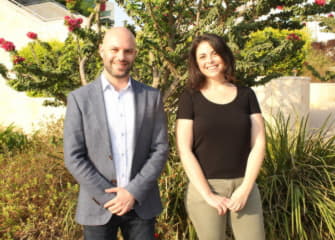
Co-founders of Phytolon -- left Dr. Halim Jubran, CEO and Dr. Tal Zeltzer, CTO
Phytolon, a portfolio company of The Trendlines Group Ltd. (SGX: 42T) (OTCQX: TRNLY) announced that it secured $4.1 million in funding for its fermentation-based technology for the production of plant-based food colors. Participating in the funding were Millennium Food-Tech (an new R&D partnership dedicated to invest in food-tech companies who have now made their second investment), EIT Food, (Europe's leading food innovation initiative), Consensus Business Group (CBG), (of British businessman, Vincent Tchenguiz), The Trendlines Group (a leading Israel and Singapore-based investment group focused on high-growth medical and agrifood technologies), Yossi Ackerman (former President and CEO of Elbit Systems), and the Israel Innovation Authority. Phytolon utilizes current scientific advancements to bring biotechnology-based, natural, high-quality food colors to the market in a cost-effective manner for the benefit of better human health and environmental sustainability.
The need for new natural food colors is increasing due to growing consumer awareness and demands for healthier food colors to replace the synthetics that may have adverse effects on our health. The lack of reliable natural alternatives with respect to quality and cost-efficiency has made the use of natural food colors a huge challenge for the food industry. The food color market reached $2.85B in 2019, with a CAGR of 5.8%, where natural colors comprise 69% of the market.
Phytolon, founded in 2018 based on licensed technology through the Weizmann Institute of Science, leverages a proprietary, fermentation-based technology to produce plant-based food colors. Since its establishment, the company has been awarded many accolades: a finalist at MassChallenge Israel 2020, AgriVest 2019, Slingshot 2019 and a runner-up in the Calcalist-Tnuva Foodtech 2019 competition. The company is recently conducting proof of concept experiments of their product's performance at production lines of leading players at the food industry.
Phytolon CEO Dr. Halim Jubran remarked, "This round will enable us to reach the market with our healthy and sustainable food colors that offer a high quality and cost-efficient solution to the food industry. The new round will also promote our collaborations with our potential clients, with whom we have been in communications during the past year and a half."
Trendlines Incubators Israel CEO Barak Singer added: "Phytolon was established following a collaboration between The Trendlines Group and the Weizmann Institute of Science. We are extremely pleased that the company, managed by Dr. Halim Jubran, secured this over-subscribed round in the mist of the COVID-19 pandemic. We look forward to the commercialization of its technology to provide healthier, more ecological and cost-effective coloring to the food technology market."
Chanan Schneider, CEO of Millennium Food-Tech added, "For us, technologies that make food more natural and healthier are innovations that change the world of food and beverages. It is clear to us that consumers are looking for products with more natural and healthier ingredients and are even willing to pay a premium for them. Phytolon brings a patented solution, perfect for the food color sector, and has garnered a lot of interest in its technology and products."
British businessman Vincent Tchenguiz noted, "We are delighted with the success of Phytolon, CBG has supported and accompanied the company for a long time and is following their impressive progress. We see the company's technology as an exceptional platform for significant development and real growth with real value for CBG's investment portfolio in Israel, which currently stands at about $ 400 million."
Prof. Asaph Aharoni, a key inventor of Phytolon's technology from the Weizmann Institute of Science added: "Phytolon's success provides an excellent example of how cutting-edge, basic science sets the stage for novel applications in the industry. Phytolon's product is a step forward towards reducing the segment of synthetic chemistry and increasing sustainability of natural resources for the food industry."


